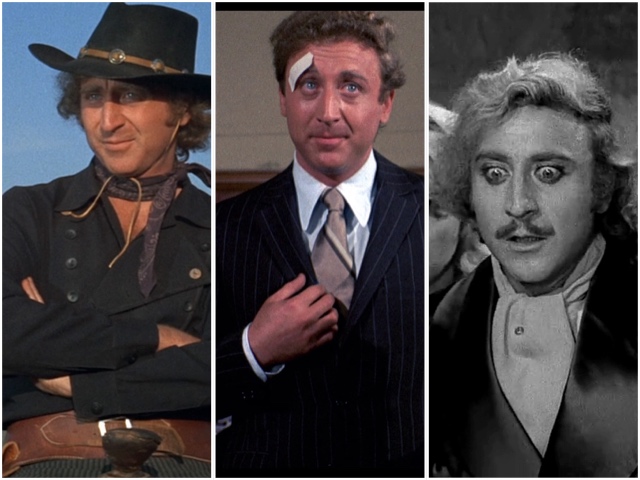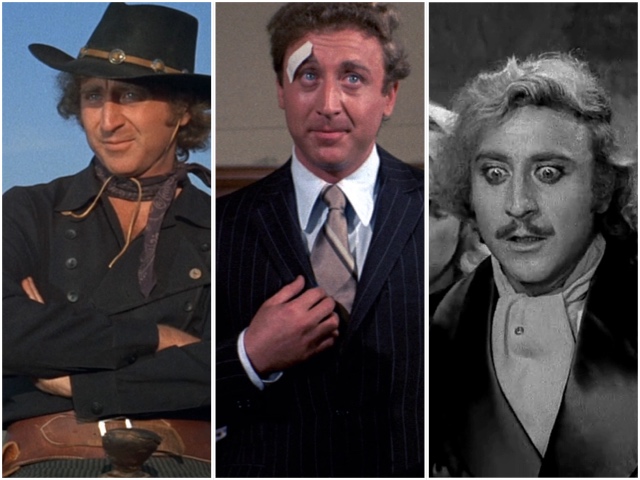The Massive Impact of Gene Wilder’s Comedy


The loss of Gene Wilder today at the age of 83 is another sad loss suffered in the entertainment world in 2016. He hadn’t appeared in a feature film since 1991, and rarely acted between then and now, choosing a quiet life in Stamford, Connecticut with his wife. There he spent his time painting, working with his charities and pursuing his second career as an author.
But the impact Wilder’s performances had on more than a few comedic masterpieces was truly massive, and had an impact on popular culture long after they played in movie theaters. A trained serious stage actor with a natural comic talent; the looks of a character actor and charisma of a romantic leading man turned him into a movie star.
Even before Wilder found film comedies, Gene Wilder’s career as an actor was truly impressive. A military veteran, Wilder appeared on Broadway 5 times in 5 years, including first a staging of One Flew Over the Cuckoo’s Nest as the ill-fated young Billy. He costarred in one of television’s teleplays, Death of a Salesman in 1966 just before arriving in Hollywood with a role in one of the definitive films of new Hollywood, Bonnie and Clyde as a nervous hostage of the bank robbers. Even in that film, Wilder’s comic spark shine brightly.
But it was Mel Brooks that saw the potential and their connection was special, a special kind of magic which came from a director finding that perfect actor to truly collaborate. Brooks’ manic energy filtered through a more restrained actor who always seemed to start out in a whisper, before exploding in excitement and/or rage. Under the direction of Brooks, Wilder arrived in Hollywood with The Producers, a daring, hilarious, performance which earned him a best supporting Oscar nomination…a shocking honor considering the Oscars’ tendency to undervalue comic performances. In just his second screen performance, Wilder made a name for himself as a finely trained actor with impeccable natural comic talent. His skills with parody and satire proved invaluable with his follow-ups Start the Revolution Without Me (opposite Donald Sutherland) and a memorable sequence in Woody Allen’s Everything You Always Wanted to Know About Sex* (*But Were Afraid to Ask), which would also be Wilder’s first box-office hit. A piece of surreal brilliance, Wilder’s doctor in love with a sheep, is a brilliant example of making everything funnier simply by underplaying.
But his collaborations with Brooks are understandably Wilder’s greatest successes, showing why the actor-director connection is so important in comedy films. And no year would be bigger for Wilder or Brooks than 1974 with two back-to-back films. In Blazing Saddles, The Waco Kid was to be played by Gig Young, but a medical emergency required a last minute replacement…a role Wilder accepted and owned with deadpan brilliance and perfect understanding of the kind of old-time westerns type character he was lampooning. And as dark as the satire could be, Wilder and Cleavon Little’s easy chemistry as fast friends adds a joyful quality to a movie which could have easily become mean-spirited.
Young Frankenstein however may be the masterpiece of both Brooks and Wilder, a film they shared writing credit on, which earned them another Oscar nomination. With familiar Brooks’ actors (Madeline Kahn, Kenneth Mars, Marty Feldman, and Cloris Leachman) and rising Hollywood talents like Teri Garr, Gene Hackman and Peter Boyle, the film proved to be a masterclass in homage-parody. Although it lacked the social minded aspects which emerged in The Producers and Blazing Saddles, Young Frankenstein’s an almost perfectly executed comedy film. And front and center as Dr. Frankenstein was Wilder, a nervous, screwball male who goes mad with the commitment of a great actor and wildness of a child playing make-believe.
The childlike quality he brought to performances, without becoming hammy or winking would prove to be signature to Wilder’s most iconic role…Willy Wonka. Although not a success when it was released, by the 1980s, millions of young people would grow up first knowing Wilder as the magical, but untrustworthy Candy Man. Beloved as a darker take on the family film, it would be hard to imagine anyone but Wilder capturing the many facets of the character in this musical-comedy…although he wasn’t the first choice. From the minute he arrives on screen, there is a nervous delight in his unnerving performance. The serious approach he takes to everything in this bizarre place full of candy and magic is continually undercut by small moments that seem to come just from Wilder. Sly grin telling us he can’t be trusted, sad glance suggesting a history we never learn, or earnest laugh and smile when he truly is overjoyed. He played up the artifice of Wonka’s world to show subtle moments of sincerity hidden behind a performance which truly was nuanced.
Watching the performance as an adult, one of Wilder’s strongest comedy influences was clearly Charlie Chaplin. So it was no surprise to read that Wilder’s favorite film was Chaplin’s The Circus, a choice which shows how much insight Wilder had as both a comic and actor. While Chaplin’s best known films include big social statements (Modern Times, The Great Dictator) or sentimentality (City Lights, The Kid), comedians love the underappreciated The Circus because of it as a prime example of how small a moment can be on screen if it’s filled with sincerity and commitment from the performer. Wilder knew all those things, and like Chaplin brought a joy and understatement to big, silly comedy that was, and still is, rare. Gene Wilder brought even the most outlandish characters his own gentleness, youthful spirit and old soul (even as a young man) which will stand the test of time…but makes Wilder one who will certainly be missed.
Read more comedy news, stories, interviews with comedians, videos and comedy clips on our home page. Get more comedy news. Watch more viral videos. Read more interviews with the best comics in the business.
.
Latest posts by Lesley Coffin (see all)
- Can a Cartoon be a Trojan horse in Politics? Our Cartoon President Uses Lightness to Deliver Truth - June 11, 2019
- Tom Rhodes New 3 Hour Album Covers Something Pretty Big: The World - March 25, 2019
- Ari Shaffir’s Renamed Storyteller Show: An Oral History - February 19, 2019
